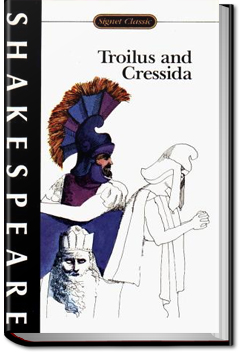

ULYSSES.
Agamemnon,
Thou great commander, nerve and bone of Greece,
Heart of our numbers, soul and only spirit
In whom the tempers and the minds of all
Should be shut up—hear what Ulysses speaks.
Besides the applause and approbation
The which,
[To AGAMEMNON]
most mighty, for thy place and sway,
[To NESTOR]
And, thou most reverend, for thy stretch'd-out life,
I give to both your speeches—which were such
As Agamemnon and the hand of Greece
Should hold up high in brass; and such again
As venerable Nestor, hatch'd in silver,
Should with a bond of air, strong as the axle-tree
On which heaven rides, knit all the Greekish ears
To his experienc'd tongue—yet let it please both,
Thou great, and wise, to hear Ulysses speak.
AGAMEMNON.
Speak, Prince of Ithaca; and be't of less expect
That matter needless, of importless burden,
Divide thy lips than we are confident,
When rank Thersites opes his mastic jaws,
We shall hear music, wit, and oracle.
ULYSSES.
Troy, yet upon his basis, had been down,<
Get ALL YOU CAN BOOKS absolutely FREE for 30 days. Download our FREE app and enjoy unlimited downloads of our entire library with no restrictions.
Have immediate access and unlimited downloads to over 200,000 books, courses, podcasts, and more with no restrictions.
Everything you download during your trial is yours to keep and enjoy for free, even if you cancel during the trial. Cancel Anytime. No risk. No obligations.
For just $24.99 per month, you can continue to have unlimited access to our entire library. To put that into perspective, most other services charge the same amount for just one book!

As avid readers, we understand the joy of immersing ourselves in a captivating story or getting lost in the pages of a good book. That's why we founded All You Can Books back in 2010, to create a platform where people can access an extensive library of quality content and discover new favorites.
Since our founding days, we’ve continuously added to our vast library and currently have over 200,000 titles, including ebooks, audiobooks, language learning courses, podcasts, bestseller summaries, travel books, and more! Our goal at All You Can Books is to ensure we have something for everyone.
Join our community of book lovers and explore the world of literature and beyond!
When I was young and naive, I loved Troilus and Cressida for its brave cynicism, but now that I am older--and my outlook is bleaker--I appreciate it for its realism and compassion. Shakespeare shows us a world in which lovers yearn to be true and warriors strive to be brave, but both inevitably fail